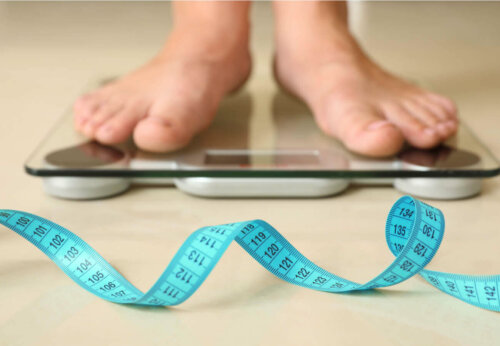How to Reach the Ideal Weight for Each Age

Being overweight is one of the most common pathologies in the developed world. This conditions a person’s aesthetics and, in addition, increases the risk of developing other types of health problems. For this reason, it’s important to know what the ideal weight for each age is in order to get as close to this value as possible.
Below, we’ll teach you how to calculate your ideal weight and share a series of tips to help you achieve this goal. Remember that, when you focus on reducing your body fat percentage, you aid your health, both in the medium and long term. Keep in mind that, if you have more questions about this, you can always consult a nutritionist.
The ideal weight for each age
You can calculate a person’s ideal weight based on their age using an equation Dr. Lundh proposed. This is the formula:
- For men: 6 + 0,78 x (height in centimeters – 100) + 0,17 x age
- For women: 7 + 0,71 x (height in centimeters – 100) + 0,17 x age
This way, you get a concrete theoretical value of how much a person should weigh. However, this equation has many limitations.
Firstly, it doesn’t take the person’s body composition into account. An athlete may straw away from the “ideal” value because they have a high percentage of muscle mass, which isn’t pathological or dangerous at all.

In the same way, it’s possible for a person to have an ideal weight but not have enough muscle. This is a factor that can predispose you to many diseases. A low percentage of muscle mass reduces strength levels, which experts consider an unhealthy situation.
In fact, muscle strength is associated with the risk of death during processes such as cancer. A study published in the Scandinavian Journal of Medicine & Science in Sports states this.
Watch your diet to reach your ideal weight
If you want to reach your ideal weight, you need to improve certain diet-related aspects. If you have excessive fat levels, you can put certain strategies such as intermittent fasting into practice. A study published by Clinical Nutrition ESPEN supports these protocols to lose weight and improve health.
In addition, it’s important to prioritize your consumption of fresh fruits, vegetables, and foods over ultra-processed ones. The latter contain simple sugars and trans fats, which are responsible for increasing systemic inflammation and metabolic problems that can condition fat mass.
On the other hand, fresh foods contain phytonutrients. These substances have antioxidant properties, meaning they can fight cell aging and damage.
Exercise to reach your ideal weight
Yes, diet is important to ensure your ideal weight. But physical exercise is equally important. Strength training will increase your muscle strength, thereby increasing your basal metabolic rate and energy expenditure. This way, it’ll be much easier to burn fatty tissue and reach your ideal weight.

At the same time, physical exercise helps reduce the risk of developing complex diseases, such as cardiovascular diseases, cancer, and metabolic diseases. Experts recommend regular muscle strength exercises, as well as aerobic exercises.
The ideal weight for each age is synonymous with health
We already showed you how to calculate the ideal weight for each age and a series of basic recommendations that can help you achieve this goal. Now we want to share some final clarifications.
First of all, remember that weight is much more than an aesthetic issue. A person’s weight is frequently related to their state of health. In fact, increasing fatty tissue and reducing muscle mass will increase the risk of suffering from chronic and inflammatory diseases.
Lifestyle habits have a decisive influence on health. Thus, you should follow a balanced and varied diet and exercise regularly to control your body composition and enjoy greater vitality. Your body will thank you for it!
Being overweight is one of the most common pathologies in the developed world. This conditions a person’s aesthetics and, in addition, increases the risk of developing other types of health problems. For this reason, it’s important to know what the ideal weight for each age is in order to get as close to this value as possible.
Below, we’ll teach you how to calculate your ideal weight and share a series of tips to help you achieve this goal. Remember that, when you focus on reducing your body fat percentage, you aid your health, both in the medium and long term. Keep in mind that, if you have more questions about this, you can always consult a nutritionist.
The ideal weight for each age
You can calculate a person’s ideal weight based on their age using an equation Dr. Lundh proposed. This is the formula:
- For men: 6 + 0,78 x (height in centimeters – 100) + 0,17 x age
- For women: 7 + 0,71 x (height in centimeters – 100) + 0,17 x age
This way, you get a concrete theoretical value of how much a person should weigh. However, this equation has many limitations.
Firstly, it doesn’t take the person’s body composition into account. An athlete may straw away from the “ideal” value because they have a high percentage of muscle mass, which isn’t pathological or dangerous at all.

In the same way, it’s possible for a person to have an ideal weight but not have enough muscle. This is a factor that can predispose you to many diseases. A low percentage of muscle mass reduces strength levels, which experts consider an unhealthy situation.
In fact, muscle strength is associated with the risk of death during processes such as cancer. A study published in the Scandinavian Journal of Medicine & Science in Sports states this.
Watch your diet to reach your ideal weight
If you want to reach your ideal weight, you need to improve certain diet-related aspects. If you have excessive fat levels, you can put certain strategies such as intermittent fasting into practice. A study published by Clinical Nutrition ESPEN supports these protocols to lose weight and improve health.
In addition, it’s important to prioritize your consumption of fresh fruits, vegetables, and foods over ultra-processed ones. The latter contain simple sugars and trans fats, which are responsible for increasing systemic inflammation and metabolic problems that can condition fat mass.
On the other hand, fresh foods contain phytonutrients. These substances have antioxidant properties, meaning they can fight cell aging and damage.
Exercise to reach your ideal weight
Yes, diet is important to ensure your ideal weight. But physical exercise is equally important. Strength training will increase your muscle strength, thereby increasing your basal metabolic rate and energy expenditure. This way, it’ll be much easier to burn fatty tissue and reach your ideal weight.

At the same time, physical exercise helps reduce the risk of developing complex diseases, such as cardiovascular diseases, cancer, and metabolic diseases. Experts recommend regular muscle strength exercises, as well as aerobic exercises.
The ideal weight for each age is synonymous with health
We already showed you how to calculate the ideal weight for each age and a series of basic recommendations that can help you achieve this goal. Now we want to share some final clarifications.
First of all, remember that weight is much more than an aesthetic issue. A person’s weight is frequently related to their state of health. In fact, increasing fatty tissue and reducing muscle mass will increase the risk of suffering from chronic and inflammatory diseases.
Lifestyle habits have a decisive influence on health. Thus, you should follow a balanced and varied diet and exercise regularly to control your body composition and enjoy greater vitality. Your body will thank you for it!
All cited sources were thoroughly reviewed by our team to ensure their quality, reliability, currency, and validity. The bibliography of this article was considered reliable and of academic or scientific accuracy.
- García Hermoso A., Ramírez Vélez R., Peterson MD., Lobelo F., et al., Handgrip and knee extension strength as predictors of cancer mortality: a systematic review and meta analysis. Scand J Med Sci Sports, 2018. 28 (8): 1852-1858.
- Santos HO., Macedo RCO., Impact of intermittent fasting on the lipid profile: assessment associated with diet and weight loss. Clin Nutr ESPEN, 2018. 24: 14-21.
This text is provided for informational purposes only and does not replace consultation with a professional. If in doubt, consult your specialist.








